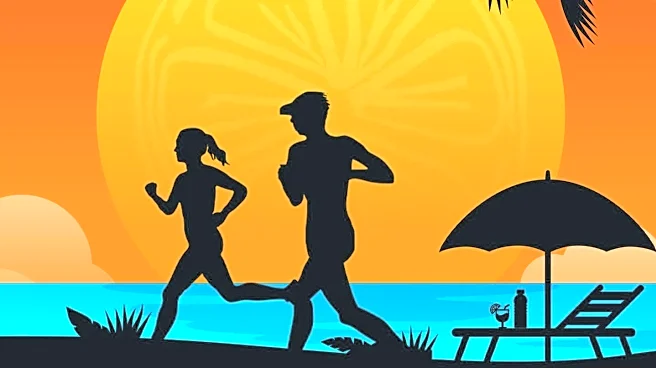What's Happening?
The concept of 'runcation' is gaining popularity among wellness enthusiasts, combining travel with running activities. This trend involves destination races or leisurely runs as a way to explore new locations, offering a full-body experience that contrasts
with traditional sightseeing. The rise of 'runcation' is part of a broader shift towards active tourism, where travelers seek to improve their wellness and productivity during vacations. This trend is supported by platforms like Strava, which foster community and social validation among runners, and the growing popularity of running clubs as social spaces.
Why It's Important?
The 'runcation' trend reflects changing consumer preferences in the travel and wellness industries, emphasizing active and health-focused experiences. This shift is significant as it aligns with the increasing cultural emphasis on longevity, wellness, and self-optimization. As travelers seek to combine leisure with personal improvement, businesses in the travel and hospitality sectors may need to adapt by offering more active and wellness-oriented packages. The trend also highlights the role of social media and technology in shaping consumer behavior and preferences.
What's Next?
As the 'runcation' trend continues to grow, travel companies and hospitality providers may expand their offerings to include more active and wellness-focused experiences. This could involve partnerships with fitness brands or the development of specialized travel packages that cater to health-conscious consumers. Additionally, the trend may lead to increased investment in infrastructure and services that support active tourism, such as running trails and wellness facilities. The emphasis on community and social interaction may also drive innovation in digital platforms that connect travelers with similar interests.
Beyond the Headlines
The rise of 'runcation' travel highlights the cultural shift towards integrating wellness into everyday life, including leisure activities. This trend may have ethical implications, as it challenges traditional notions of vacation as a time for rest and relaxation. The focus on productivity and self-improvement during travel may also reflect broader societal pressures to optimize personal time and resources. As the trend evolves, it may influence how individuals perceive and prioritize wellness in their lives, potentially leading to long-term changes in lifestyle and travel habits.
















